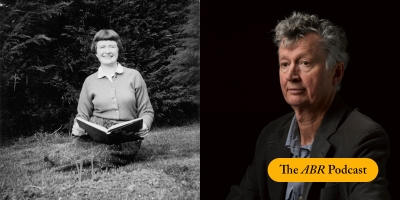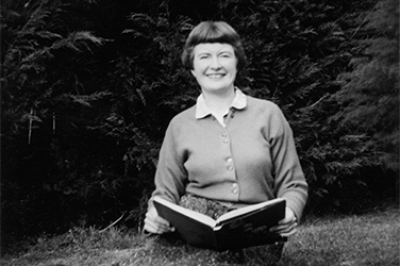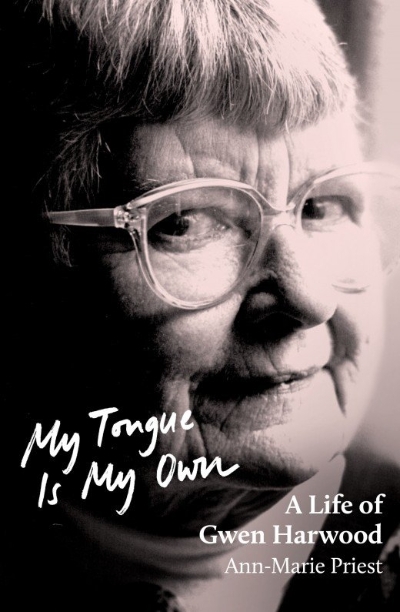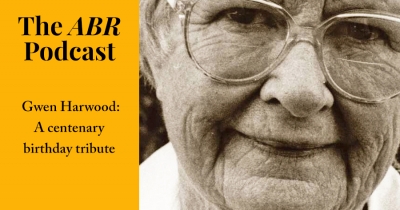Gwen Harwood
Ann-Marie Priest’s My Tongue Is My Own, published by La Trobe University Press and reviewed in our June issue, is the first authorised biography of the Australian poet Gwen Harwood (1920–1995). Unsurprisingly, this was not the first attempt to record the life of one of Australia’s most loved and admired poets. In an exclusive feature for ABR, John Harwood reflects on the conflicting motives behind his literary executorship of his mother’s estate – an estate holding the secrets to an at-times fractious marriage between two opposing temperaments.
... (read more)When Ann-Marie Priest wrote to me in 2015 asking whether she might talk to me about her proposed biography of my mother, and requesting my permission to examine some correspondence in the Fryer Library, which I, as Gwen Harwood’s literary executor, had placed on restricted access, I replied with a terse refusal to cooperate. Since my mother’s death in December 1995, I had kept tight control of her vast correspondence, nearly all of which she had donated to various research libraries over the last two decades of her life, and I saw no reason to change my ways.
... (read more)My Tongue Is My Own: A life of Gwen Harwood by Ann-Marie Priest
For much of her career, Gwen Harwood (1920–95) was best known for her hoaxes, pseudonyms, and literary tricks. Most notorious was the so-called Bulletin hoax in 1961, but over the years she orchestrated a number of other raids on literary targets, mainly aimed at challenging the power of poetry editors and gatekeepers. For L’Affaire Bulletin (as she sometimes called it), she submitted to that august magazine, under the pseudonym Walter Lehmann, a pair of seemingly unexceptionable sonnets on the theme of Abelard and Eloisa. Only after the poems were published did the Bulletin discover that they were acrostics; read vertically, one spelled out ‘So long Bulletin’, and the other, ‘Fuck all editors’.
... (read more)Gwen Harwood, who died in 1995, was born on 8 June 1920, in Brisbane, of course, which she went loved dearly. Harwood seems increasingly to have been one of the finest poets Australia has ever produced. She was much loved; anyone who knew her relished her wit, her directness, her inextinguishable spirit. To mark the centenary of her birth, ABR asked a number of her colleagues and admirers to record some of her poems. Happily, there are hundreds of them to explore.
... (read more)Roll back, you fabulous animal
be human, sleep. I’ll call you up
from water’s dazzle, wheat-blond hills,
clear light and open-hearted roses,
this day’s extravagance of blue
stored like a pulsebeat in the skull.
Five poems have been shortlisted in the 2016 Peter Porter Poetry Prize. The poets are Dan Disney, Anne Elvey, Amanda Joy, Lisa Gluskin Stonestreet, and Campbell Thomson; their poems can be read here. The judges on this occasion were Luke Davies, Lisa Gorton, and Kate Middleton.
Join us at our studio in Boyd Community Hub on Wednesday, 9 March (6 pm), when the poets will introduce and read their works, followed by the announcement of the overall winner, who will receive $5,000 and an Arthur Boyd print. This is a free event, but reservations are essential.
These ceremonies always commence with a series of readings of poems written by Peter Porter (1929–2010). This year our readers – Judith Bishop (winner in 2006 and 2011), Morag Fraser, Lisa Gorton, and Peter Rose among them – may choose to dip into the new collection of late Porter poems: Chorale at the Crossing (Picador, $24.99 pb).
... (read more)Dust without dimension
The November 13 attacks on ordinary citizens in Paris have outraged and galvanised the world community. We share this sense of revulsion. Australia has a large French population and a rich tradition of Francophilia. Our sympathies go to our French readers and to the families of all the victims.
Words, at such times, are de trop. Not La Marseillaise





